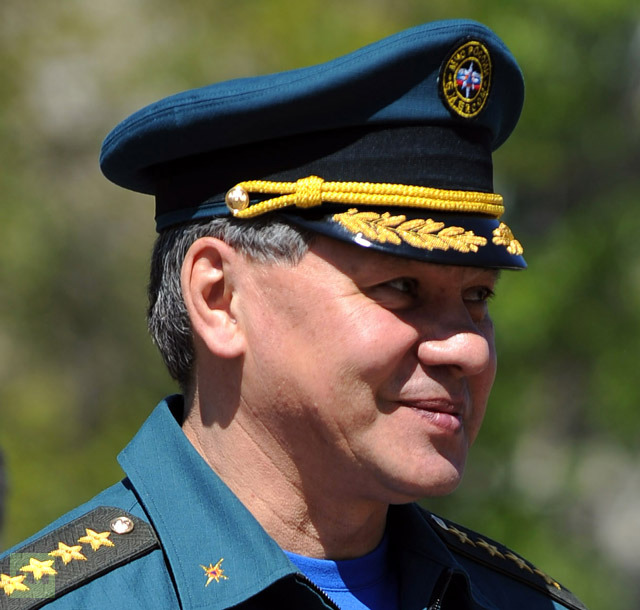
In the extended haggling for influence in Ukraine, the U.S. led yesterday with third round of targeted sanctions against Russia.
The U.S. was joined in this effort by Canada and the European Union in specifically going after 17 companies.
In Russia — where 110 people are reported to own 30 percent of the national wealth — these kinds of sanctions offer a powerful tool of diplomacy and economic and fiscal levers of influence against Putin’s Russia.
While they may not have the immediate effect of stopping – much less reversing – Russia’s intentions in their near abroad, they will certainly shape the strategic calculations of President Vladimir Putin and his oligarchs.
Russian Defense Minister, Sergei Shoigu, also spoke with U.S. Secretary of Defense Chuck Hagel in a lengthy phone conversation on Monday.
According to the press reports and translations, Shoigu reiterated that the Government of Ukraine has amassed a force of 15,000 troops with armor, mechanized forces and indirect fire systems, “against the peaceful population of their own country.”
Normally, one would expect that a Permanent Member of the Security Council would use diplomatic means to address a concern inside the sovereign borders of a neighboring country – Russia sees another approach based on coercion, intimidation and fear.
Outsiders are concerned about the growing evidence that would seem to indicate that Russian special forces have deeply infiltrated Ukraine’s eastern provinces as agents provocateur to purposely destabilize the region so that Ukraine faces a lose-lose proposition.
If they take no action to secure and pacify the region, they fall victim to claims of ineffective governance; if they take measures to reassert governance, they are trampling on human rights and violating international norms of behavior towards an ethnic Russian population that dominates the census of the eastern borderlands.
Shoigu denied the “unfounded assertions” that Russian troops are inside Ukraine and purposely destabilizing the situation, adding that when the Ukrainian government stated that they “had no intention of using regular military units against unarmed people, Russian troops were ordered back to their bases.”
He did not clarify if this included Russian troops already inside Ukraine, but certainly the “spiking” of operational activities serves as a military supporting effort of diplomatic and strategic campaign design to strongly pressure Ukraine and assert Russia’s pre-eminence in their near abroad region.
U.S. leaders — and allies throughout Europe — must resist the temptation of any siren song from Moscow that this is a de-escalation of tensions.
This is a calculated set of familiar Russian ploys to exhaust Ukrainian leaders and third country leaders alike into a reluctant acceptance of a new assertive Russian-led status quo. Secretary Hagel and others should not be reassured by these statements. Agreeing in principle to “continue conversations on a way forward” is not a strategy – it is trading time and space for a solution-seeking process. Meanwhile the Russian wolves are circling the prey.
What Ukraine and the West must do is concurrently plan for this week, this month and this summer as a prelude to what will come next winter (only a few months away in this cold region) when Russia is able to deploy the energy weapon.
“General Winter” has always been Russia’s primary strategic deterrent, and it will enable a new set of intermediate campaign objectives in November when the ground begins to freeze and the snow starts falling north of the Alps, from Bremerhaven to Belarus and beyond.
Ukrainian forces are poorly positioned to quickly respond to threats in the east, reflecting a Cold War forward deployment paradigm that oriented them towards the west, either to defend against NATO or — more likely — to be forward staged and ready to attack through Romanian and Polish corridors towards the Atlantic. As Napoleon once noted, it is hard to recover from an initial poor position – and that is where Ukraine’s forces find themselves now.
Thus the West must observe and check Russia’s greater ambitions to return to pre-eminence at the strategic level by using other tools of power. We simply cannot get forces into those regions where the Ukrainians themselves are lacking, but we can continue diplomatic and economic maneuvers even as we increase our presence in the eastern-most NATO member states of Romania, Poland, Hungary, Slovakia and the Baltics.
We have to keep our eye on Moldova – a simmering strategic sore point for more than a decade now, as well as watch what the Russians are up to on the high seas and with their aggressive new re-armament policies. At the grand strategic level, the threat is that Russia is playing ‘small ball’ in Eastern Europe, and whilst everyone is watching this, they are missing the other global strategic initiatives of Putin’s Russia.
The ability of the U.S. to simultaneously conduct a head of state trip through Asia while dealing with this crisis reflects an emerging ability of the U.S., even if reluctantly so, to exert global leadership and influence. Ironically — in pushing so hard — Russia may have inadvertently prompted a break in the cycle of American isolationism, and a quicker “Return to Europe” than what Kremlin envisioned.
Putin will strive to find the ‘sweet spot’ to stay below a triggering action that coalesces the Alliance against him. He is aware that the U.S. has mid-term elections this year, and that sanctions can only work if they are integrated and synchronized between the Allies.
To not give full and careful consideration to any combination of these three factors is to allow Putin to seek strategic “decoupling” of the Alliance, and weaken the effects of our concerted efforts. Rather than be re-assured, be need to be renewed in our vigilance to track, confront and construct a working rough peace with Russia across the globe where Russia also has – and is pursuing vigorously – their interests while they perceive America as retrenching, and Europe as reluctant.





